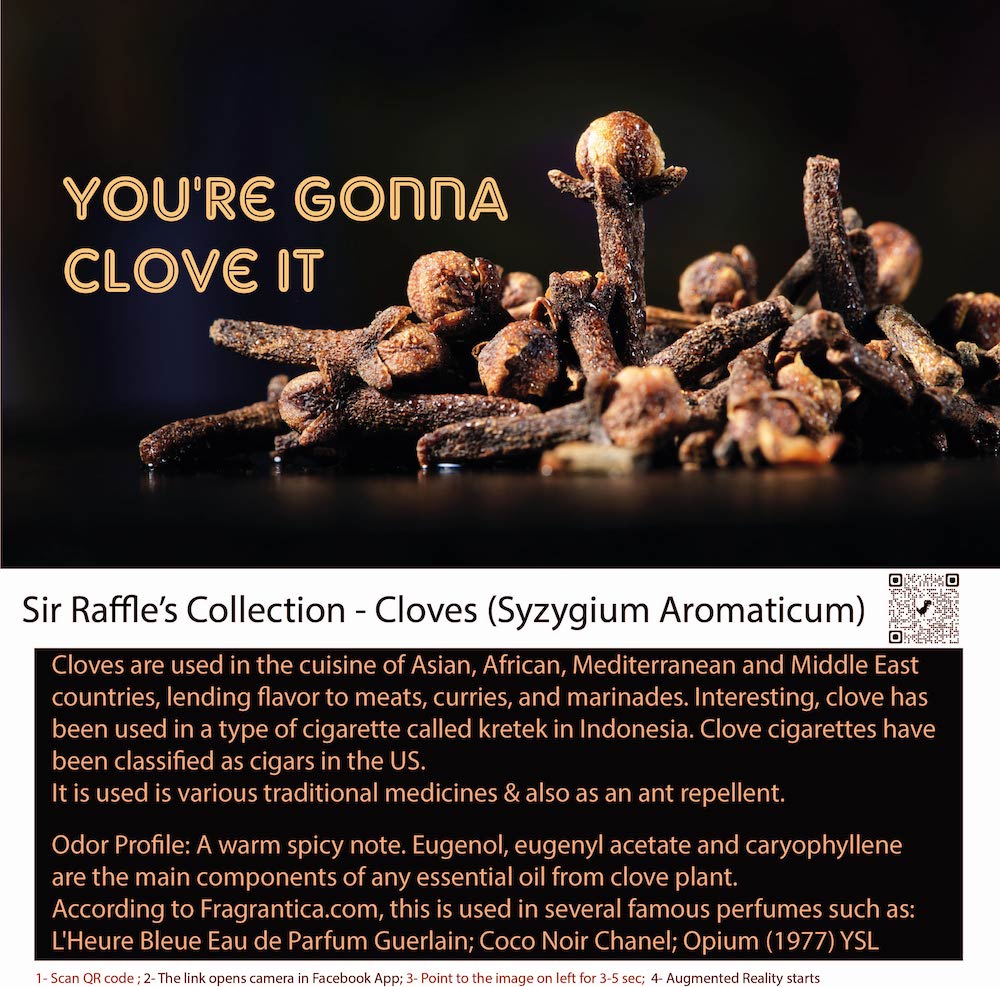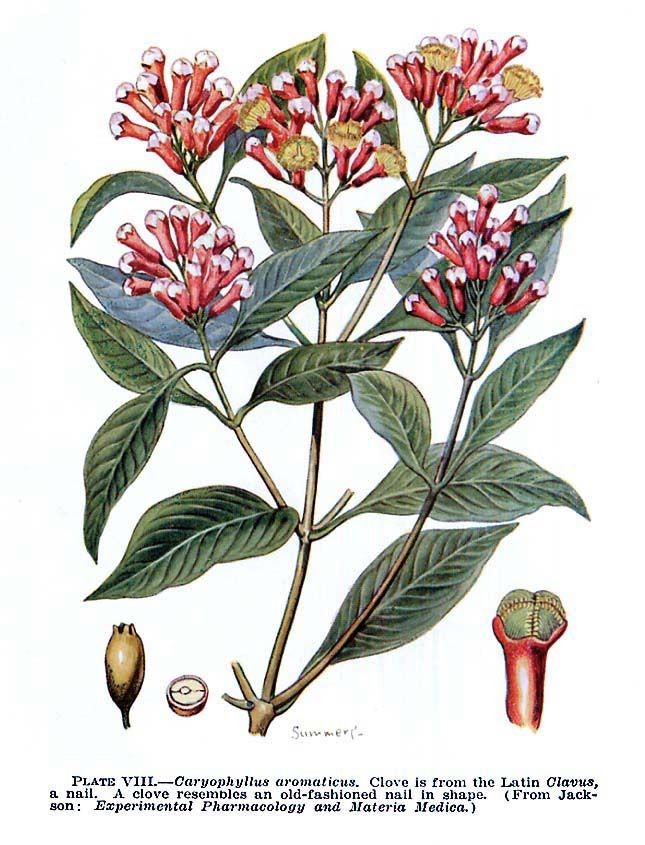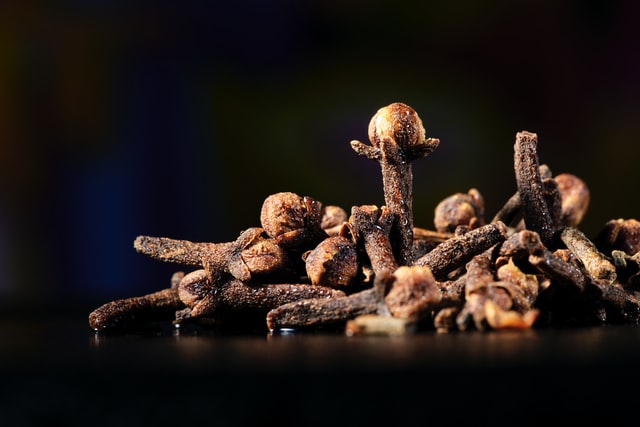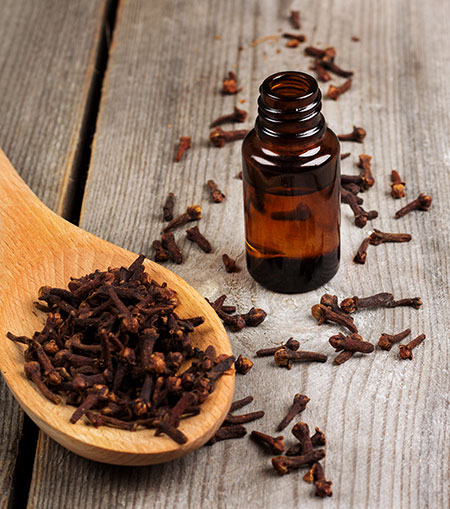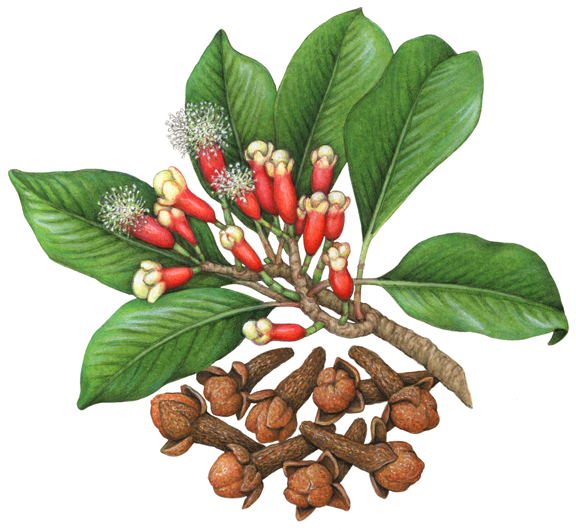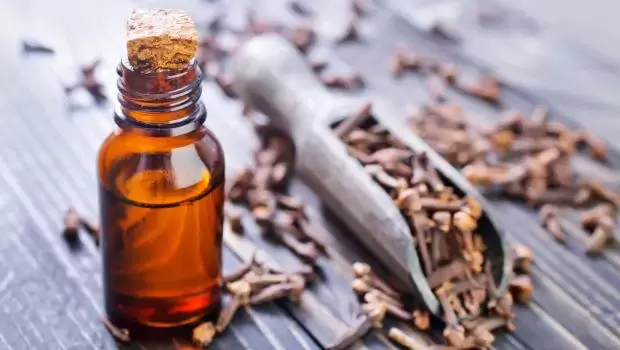Captivating Clove Aroma Crafted for Men
Clove, scientifically known as Syzygium aromaticum, is an aromatic spice that has been cherished and utilized for centuries in various cultures around the world. Native to Indonesia's Maluku Islands, cloves are the dried flower buds of the clove tree, an evergreen tree that belongs to the Myrtaceae family. Cloves are rich in essential oils, primarily eugenol, which gives them their distinctive aroma and numerous therapeutic properties.
History and Culinary Use: Cloves have a long and fascinating history dating back to ancient times. The ancient Chinese, Egyptians, and Romans utilized cloves for various purposes, including as a spice in cooking, a breath freshener, and even as a form of currency for trading. Cloves were highly valued and played a significant role in the spice trade during the Middle Ages, with their origin being a well-guarded secret to maintain their high value.
In the culinary world, cloves are prized for their warm, sweet, and aromatic flavor. They are a popular ingredient in spice blends, such as garam masala and pumpkin spice, and are used to add depth and complexity to both savory and sweet dishes. Cloves are commonly used in baked goods, marinades, stews, and mulled beverages, and they pair well with other spices like cinnamon, nutmeg, and allspice.
Medicinal and Therapeutic Properties: Clove has a long history of use in traditional medicine systems, including Ayurveda and Traditional Chinese Medicine (TCM). The primary bioactive compound in cloves, eugenol, is responsible for many of its health benefits. Eugenol is known for its antimicrobial, anti-inflammatory, antioxidant, and analgesic properties.
In traditional medicine, cloves have been used to alleviate digestive issues, relieve toothaches, and treat respiratory conditions. Clove oil is often used topically to provide relief from pain and inflammation, such as sore muscles and joints. It is also used as a natural remedy for toothache and gum infections due to its numbing and antibacterial effects.
Aromatherapy and Perfumery: Clove's rich and powerful aroma has made it a popular ingredient in perfumery and aromatherapy. Clove essential oil is derived from the dried flower buds through steam distillation, capturing its concentrated aromatic compounds. The oil's warm and spicy fragrance adds depth and intensity to perfumes, especially in oriental and spicy fragrance compositions.
In aromatherapy, clove essential oil is valued for its invigorating and energizing properties. It is often used to promote a sense of warmth and comfort and to alleviate feelings of fatigue and mental exhaustion. The oil's stimulating scent is believed to enhance focus and mental clarity.
Clove in Modern Medicine: In modern medicine, clove oil and eugenol have been the subject of numerous studies investigating their potential therapeutic applications. Research has shown that eugenol possesses antimicrobial properties, making it effective against various bacteria and fungi. It has also exhibited anti-inflammatory effects, which may have applications in managing inflammatory conditions.
However, it is essential to use clove and its essential oil in moderation and under appropriate guidance, as excessive use can lead to side effects, including skin irritation and gastrointestinal disturbances.
In conclusion, cloves are not only a beloved spice in culinary delights but also a valuable herb with a rich history in traditional medicine and modern research. Whether used in cooking, aromatherapy, or for medicinal purposes, cloves continue to captivate and enhance our lives with their warm and aromatic presence.
History and Culinary Use: Cloves have a long and fascinating history dating back to ancient times. The ancient Chinese, Egyptians, and Romans utilized cloves for various purposes, including as a spice in cooking, a breath freshener, and even as a form of currency for trading. Cloves were highly valued and played a significant role in the spice trade during the Middle Ages, with their origin being a well-guarded secret to maintain their high value.
In the culinary world, cloves are prized for their warm, sweet, and aromatic flavor. They are a popular ingredient in spice blends, such as garam masala and pumpkin spice, and are used to add depth and complexity to both savory and sweet dishes. Cloves are commonly used in baked goods, marinades, stews, and mulled beverages, and they pair well with other spices like cinnamon, nutmeg, and allspice.
Medicinal and Therapeutic Properties: Clove has a long history of use in traditional medicine systems, including Ayurveda and Traditional Chinese Medicine (TCM). The primary bioactive compound in cloves, eugenol, is responsible for many of its health benefits. Eugenol is known for its antimicrobial, anti-inflammatory, antioxidant, and analgesic properties.
In traditional medicine, cloves have been used to alleviate digestive issues, relieve toothaches, and treat respiratory conditions. Clove oil is often used topically to provide relief from pain and inflammation, such as sore muscles and joints. It is also used as a natural remedy for toothache and gum infections due to its numbing and antibacterial effects.
Aromatherapy and Perfumery: Clove's rich and powerful aroma has made it a popular ingredient in perfumery and aromatherapy. Clove essential oil is derived from the dried flower buds through steam distillation, capturing its concentrated aromatic compounds. The oil's warm and spicy fragrance adds depth and intensity to perfumes, especially in oriental and spicy fragrance compositions.
In aromatherapy, clove essential oil is valued for its invigorating and energizing properties. It is often used to promote a sense of warmth and comfort and to alleviate feelings of fatigue and mental exhaustion. The oil's stimulating scent is believed to enhance focus and mental clarity.
Clove in Modern Medicine: In modern medicine, clove oil and eugenol have been the subject of numerous studies investigating their potential therapeutic applications. Research has shown that eugenol possesses antimicrobial properties, making it effective against various bacteria and fungi. It has also exhibited anti-inflammatory effects, which may have applications in managing inflammatory conditions.
However, it is essential to use clove and its essential oil in moderation and under appropriate guidance, as excessive use can lead to side effects, including skin irritation and gastrointestinal disturbances.
In conclusion, cloves are not only a beloved spice in culinary delights but also a valuable herb with a rich history in traditional medicine and modern research. Whether used in cooking, aromatherapy, or for medicinal purposes, cloves continue to captivate and enhance our lives with their warm and aromatic presence.
To experience augmented reality, please open the Facebook-app using QR code and point to the image below
Discover the Essence of Oriental Fragrance
Cloves are the aromatic flower buds of a tree in the family Myrtaceae, Syzygium aromaticum. They are native to the Maluku Islands (or Moluccas) in Indonesia, and are commonly used as a spice. Although Indonesia is the largest producer of Cloves, Zanzibar and Madagascar are the major exporters, where Clove trees cover thousands of acres of the islands. Historically, Cloves originating from Madagascar have been considered superior.
Clove is a spice that has been used for thousands of years in traditional medicine to treat a wide range of ailments. The main active ingredient in clove is eugenol, which is a natural antiseptic, analgesic and anti-inflammatory compound. Some of the therapeutic benefits of clove include:
Clove is a spice that has been used for thousands of years in traditional medicine to treat a wide range of ailments. The main active ingredient in clove is eugenol, which is a natural antiseptic, analgesic and anti-inflammatory compound. Some of the therapeutic benefits of clove include:
- Toothache relief: Clove oil has been traditionally used as a natural remedy for toothache. Eugenol, the main compound in clove oil, has a numbing effect on the nerves, which can help to reduce the pain associated with toothaches.
- Digestive aid: Clove can be helpful for people with digestive issues such as gas, bloating, and stomach discomfort. Its carminative properties help to relieve gas and bloating, while also promoting digestion.
- Antimicrobial: Clove oil has been found to have antimicrobial properties, meaning it can help to fight against certain types of bacteria, viruses, and fungi. This is why it is used traditionally as a natural remedy for infections such as candida, ringworm, and scabies.
- Antioxidant: Clove is rich in antioxidants, which help to protect the body against harmful free radicals. These compounds can help to reduce inflammation, slow down the aging process, and lower the risk of certain diseases.
- Analgesic: Clove oil has been traditionally used as a natural remedy for pain, especially in cases of osteoarthritis, rheumatoid arthritis, and neuralgia.
Unveiling the Allure of Clove Oriental Scent for Men
The clove tree is an evergreen that grows up to 8–12 metres (26–39 ft) tall, with large leaves and crimson flowers grouped in terminal clusters. Cloves are used in the cuisine of Asian, African, Mediterranean, and the Near and Middle East countries, lending flavor to meats, curries, and marinades, as well as fruit such as apples, pears, and rhubarb.
The spice is used in a type of cigarette called kretek in Indonesia. Clove cigarettes have been smoked throughout Europe, Asia, and the United States. Since 2009, clove cigarettes have been classified as cigars in the US
Clove is a popular essential oil used in aromatherapy for its warming, invigorating and stimulating properties. The scent of clove oil is strong, spicy and sweet, which can help to improve mood, increase energy levels and mental focus. Some of the benefits of using clove oil in aromatherapy include:
The spice is used in a type of cigarette called kretek in Indonesia. Clove cigarettes have been smoked throughout Europe, Asia, and the United States. Since 2009, clove cigarettes have been classified as cigars in the US
Clove is a popular essential oil used in aromatherapy for its warming, invigorating and stimulating properties. The scent of clove oil is strong, spicy and sweet, which can help to improve mood, increase energy levels and mental focus. Some of the benefits of using clove oil in aromatherapy include:
- Stimulating the mind and body: The strong, spicy aroma of clove oil can help to boost energy levels, improve mental focus and concentration, and reduce feelings of fatigue.
- Relieving pain: The natural pain-relieving properties of clove oil can be helpful for people with conditions such as osteoarthritis, rheumatoid arthritis, and neuralgia.
- Improving respiratory health: The expectorant properties of clove oil can help to clear the lungs and relieve respiratory issues such as asthma, bronchitis, and colds.
- Relieving stress and anxiety: The warm and comforting aroma of clove oil can help to reduce feelings of stress and anxiety, promoting a sense of calm and relaxation.
- Killing germs and bacteria: The antimicrobial properties of clove oil can help to kill germs and bacteria in the air, making it a natural air purifier and disinfectant.
Our Commitment to Crafting Distinctive Men's Fragrances
- The history of cloves is similar to that of nutmeg and mace. Evidence of cloves has been found at Terqa, Syria dating to 1720 BCE.
- In the third century BC, Chinese emperors of the Han Dynasty required those who addressed them to chew cloves to freshen their breath.
- Cloves reached the Roman world by the first century AD, where they were described by Pliny the Elder.
- By 176 AD, cloves had reached Egypt.
From the 8th century, cloves became increasingly popular in Europe, and along with nutmeg, the importation of this coveted spice helped the enterprising Venetians become extraordinarily wealthy. The lure of cloves and nutmeg attracted the Portuguese to the Spice Islands in 1514; they were followed by the Dutch in 1605, and they retained control over the trade until late in the 18th century, at which time the exotic spices of the Moluccas were starting to be grown elsewhere in the world, and they lost their incredible attraction.
Clove is a popular essential oil used in aromatherapy for its warming, invigorating and stimulating properties. The scent of clove oil is strong, spicy and sweet, which can help to improve mood, increase energy levels and mental focus. Some of the benefits of using clove oil in aromatherapy include:
Stimulating the mind and body: The strong, spicy aroma of clove oil can help to boost energy levels, improve mental focus and concentration, and reduce feelings of fatigue.
Relieving pain: The natural pain-relieving properties of clove oil can be helpful for people with conditions such as osteoarthritis, rheumatoid arthritis, and neuralgia.
Improving respiratory health: The expectorant properties of clove oil can help to clear the lungs and relieve respiratory issues such as asthma, bronchitis, and colds.
Relieving stress and anxiety: The warm and comforting aroma of clove oil can help to reduce feelings of stress and anxiety, promoting a sense of calm and relaxation.
Killing germs and bacteria: The antimicrobial properties of clove oil can help to kill germs and bacteria in the air, making it a natural air purifier and disinfectant.
Clove oil can be used in a variety of ways in aromatherapy, including diffusing it with a diffuser, adding a few drops to a warm bath or shower, or massaging it into the skin with a carrier oil. It's important to note that clove oil is very potent and should be used with care and in small quantities, it should not be used by pregnant women, children or people with sensitive skin, and always should be diluted before use. Consult with a qualified aromatherapist before using clove oil.
Clove is a spice that has a long history of use in Singapore and the surrounding region. Cloves are the dried flower buds of the evergreen clove tree, which is native to the Maluku Islands in Indonesia. Cloves have been used in cooking and medicine for centuries, and they have also been used as a valuable trading commodity. In the past, cloves were a highly sought-after spice, and they were used to flavor food, preserve meats, and mask unpleasant odors.
In the 18th and 19th centuries, Singapore emerged as a major trading hub for cloves, along with other spices such as nutmeg and pepper. The British established a trading post in Singapore in 1819, and the island quickly became an important center for the trade of cloves and other spices. Singapore's location at the southern tip of the Malay Peninsula made it an ideal location for the trade of spices from the Maluku Islands, and it served as a major entrepot for the trade of cloves and other spices between Asia, Europe, and the Americas.
In the late 19th and early 20th centuries, the demand for cloves and other spices began to decline as synthetic alternatives were developed. However, cloves continue to be used in cooking and traditional medicine in Singapore and the surrounding region, and the spice is still widely available in markets and supermarkets.
In modern Singapore, cloves are not widely used in the culinary, but it is still an important ingredient in traditional medicine and as a fragrance. Cloves are also used in many traditional rituals and ceremonies, such as the burning of "clove cigarettes" as an offering to the gods in certain Chinese rituals.
Exploring the Richness of Clove Essential Oil
“Both cloves and the oil are stimulant, aromatic, and carminative. Cloves in substance or infusion are sometimes given to relieve nausea and vomiting, more especially the vomiting of pregnancy, to relieve flatulence, and to except weak digestion. The oil of cloves sometimes affords relief when introduced into the cavity of a carious tooth.”
Here are some fun facts about cloves:
Here are some fun facts about cloves:
- The name "clove" comes from the Latin word "clavus," which means "nail." This is because the shape of a clove bud resembles a small nail.
- Cloves are the dried flower buds of the evergreen clove tree, which is native to the Maluku Islands in Indonesia.
- Cloves are one of the oldest known spices, and they have been used for thousands of years in cooking, medicine, and religious rituals.
- In ancient China, cloves were used as a breath freshener and to mask bad breath.
- In medieval Europe, cloves were used to preserve meats and to mask the smell of rotting food.
- Cloves were used as a treatment for toothache and other dental problems. Clove oil was used to numb the pain, and ground cloves were used to clean teeth.
- Cloves were once so valuable that they were used as a form of currency.
- Cloves were one of the most valuable spices of the spice trade, along with nutmeg and pepper.
- Clove oil is one of the most powerful natural antiseptics known, it is also used as an anesthetic and anti-inflammatory.
- Cloves are a rich source of antioxidants, which help to protect the body against damage from free radicals.
- Cloves are also used to make kretek cigarettes, a traditional cigarette from Indonesia.
Experience the Masculine Appeal of Oriental Aromatherapy
Cloves contains eugenol which is an effective local anesthetic, and this has long been used in dentistry. Other constituents include salicylic acid. Other important essential oil constituents of clove oil include acetyl eugenol, beta-caryophyllene, vanillin, crategolic acid, tannins such as bicornin, gallotannic acid, methyl salicylate (painkiller), the flavonoids eugenin, kaempferol, rhamnetin, and eugenitin, triterpenoids such as oleanolic acid, stigmasterol, and campesterol and several sesquiterpenes.
Clove, considered an aphrodisiac, was a highly valued flavor, a possible food preservative, and a pharmaceutical panacea in past centuries. Now, it is a rarely appreciated spice and an old-fashioned drug that has little role in medicine or dentistry today. Eugenol has not been classified for its potential toxicity.
The aroma profile of clove is primarily composed of a group of compounds known as eugenol, eugenol acetate, and caryophyllene.
Eugenol is the main compound responsible for the warm, spicy, and woody aroma of clove. It's also responsible for the slight medicinal and anesthetic properties of clove oil. Eugenol acetate is a derivative of eugenol, and it is responsible for the fruity and floral notes in clove.
Caryophyllene is a terpene compound that is responsible for the spicy and woody aroma of clove. It's also found in other spices such as black pepper and cinnamon, as well as in the essential oils of many plants.
Additionally, there are other minor compounds like trans-anethole, methyl eugenol, and β-caryophyllene that are responsible for the warm, spicy, and woody aroma of clove.
Clove, considered an aphrodisiac, was a highly valued flavor, a possible food preservative, and a pharmaceutical panacea in past centuries. Now, it is a rarely appreciated spice and an old-fashioned drug that has little role in medicine or dentistry today. Eugenol has not been classified for its potential toxicity.
The aroma profile of clove is primarily composed of a group of compounds known as eugenol, eugenol acetate, and caryophyllene.
Eugenol is the main compound responsible for the warm, spicy, and woody aroma of clove. It's also responsible for the slight medicinal and anesthetic properties of clove oil. Eugenol acetate is a derivative of eugenol, and it is responsible for the fruity and floral notes in clove.
Caryophyllene is a terpene compound that is responsible for the spicy and woody aroma of clove. It's also found in other spices such as black pepper and cinnamon, as well as in the essential oils of many plants.
Additionally, there are other minor compounds like trans-anethole, methyl eugenol, and β-caryophyllene that are responsible for the warm, spicy, and woody aroma of clove.
Discover the Perfect Men's Scent in Clove Aroma
Clove is a popular scent note in perfumery, and it is often used as a base note or middle note in perfumes. The warm, spicy, and woody aroma of clove is often used to add depth and complexity to perfumes, and it is often paired with other spices, woods, and resins to create rich and complex scents.
Some famous perfume brands that feature clove as a scent note include:
Some famous perfume brands that feature clove as a scent note include:
- Tom Ford's "Tobacco Vanille" is a warm, spicy fragrance that features clove, tobacco, vanilla, and tonka bean.
- Jo Malone's "Pomegranate Noir" is a fruity and spicy fragrance that features clove, pomegranate, and pink pepper.
- Le Labo's "Santal 33" is a woody and spicy fragrance that features clove, sandalwood, and cedarwood.
- Hermès' "Terre d'Hermès" is a woody and spicy fragrance that features clove, pink pepper, and grapefruit.
- Histoires de Parfums' "1969" is a spicy and woody fragrance that features clove, cedarwood, and patchouli.
- Le Labo's "Labdanum 18" is a warm and spicy fragrance that features clove, labdanum, and patchouli.
- Dior's "Sauvage" is a fresh and spicy fragrance that features clove, bergamot, and ambroxan.
Join Scentopia, Sentosa's latest tourist attraction wonderful orchid scent crafting, fragrance tour, bridal shower or corporate team building which includes perfume making onsite and offsite, beach activities and more. We also serve primary school learning journey, secondary students and pupil on industrial excursions. Know more about our orchids perfume bar or therapeutic orchid scents and other wellness aromas. Conatct Perfume workshop or book a scent crafting session here.

